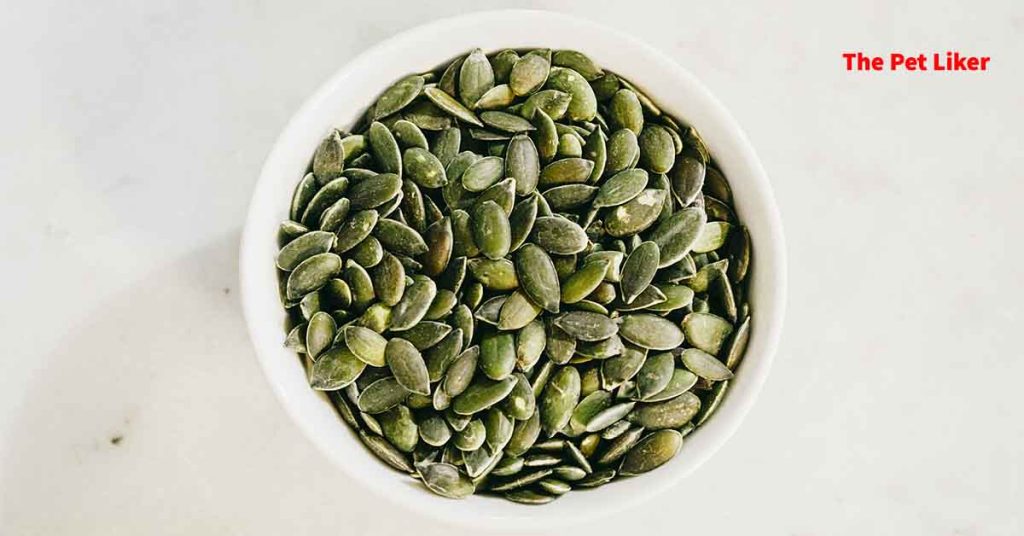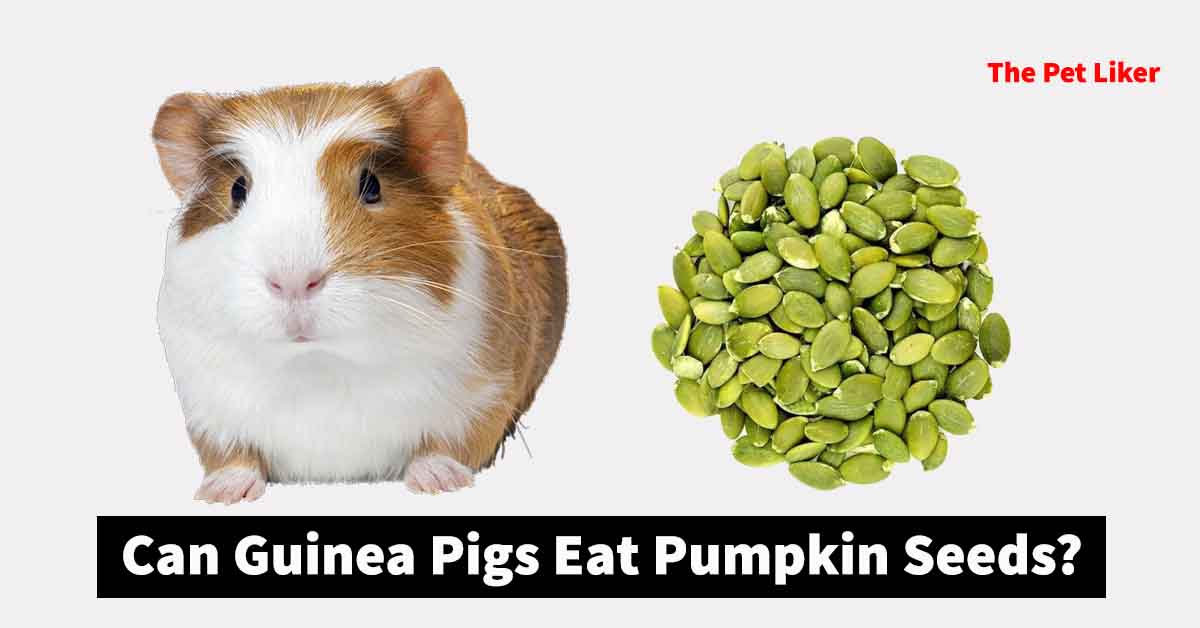As a pet owner, it’s important to make sure that your furry friend is receiving a healthy and balanced diet.
While guinea pigs primarily eat hay, fresh vegetables, and a limited amount of fruits, you may be wondering if pumpkin seeds are a safe addition to their diet.
Pumpkin seeds are a popular snack for humans, but can they be given to guinea pigs?
In this article, we will explore the benefits and risks of feeding pumpkin seeds to guinea pigs and provide guidance on how to incorporate them into their diet, if at all.
The Nutritional Value of pumpkin seeds
Pumpkin seeds are an excellent source of nutrition for humans and some animals due to their high content of protein, healthy fats, and essential minerals. Here are some of the key nutrients found in pumpkin seeds:
- Protein: Pumpkin seeds are a great source of plant-based protein, which is important for the growth and repair of body tissues.
- Healthy Fats: Pumpkin seeds are rich in unsaturated fatty acids, including omega-3 and omega-6, which are essential for maintaining healthy skin, coat, and brain function.
- Minerals: Pumpkin seeds are a good source of essential minerals, including magnesium, potassium, zinc, and iron. These minerals are important for bone health, muscle function, and immune system support.
- Vitamins: Pumpkin seeds are a good source of vitamin E, an antioxidant that supports healthy skin and immune system function.
Can Guinea Pigs Eat Pumpkin Seeds?
Guinea pigs can eat pumpkin seeds in moderation, but they should not be a regular part of their diet. Pumpkin seeds are high in fat and phosphorus, which can cause health problems if fed in excessive amounts.
Guinea pigs have specific dietary requirements that are best met by a diet of hay, fresh vegetables, and a limited amount of fruits.
If you decide to offer your guinea pig pumpkin seeds as a treat, make sure they are unsalted and unflavored. You should also limit the amount to no more than one or two seeds a day, and make sure to remove any uneaten seeds from their cage to prevent spoilage.
As with any new food, introduce pumpkin seeds gradually and monitor your guinea pig for any signs of digestive upset or allergic reactions.
If you are unsure about whether pumpkin seeds are appropriate for your guinea pig, consult with a veterinarian who is knowledgeable about guinea pig nutrition.

Is It Safe For Guinea Pigs?
In general, feeding small amounts of unsalted, unflavored pumpkin seeds to guinea pigs is safe.
It’s important to keep in mind that guinea pigs have specific dietary requirements, and their main diet should consist of hay, fresh vegetables, and a limited amount of fruits.
Pumpkin seeds should only be given as an occasional treat and should not be a regular part of their diet.
It’s also important to note that pumpkin seeds are high in fat and phosphorus, which can lead to health problems if consumed in excessive amounts.
Too much fat can cause obesity, liver problems, and other health issues, while too much phosphorus can lead to bladder and kidney stones.
It’s important to limit the amount of pumpkin seeds given to guinea pigs and make sure to remove any uneaten seeds from their cage.
Benefits ✅
Pumpkin seeds can offer some health benefits to guinea pigs when fed in moderation as part of a balanced diet. Here are some potential benefits:
- Protein: Pumpkin seeds are a good source of plant-based protein, which is important for the growth and repair of body tissues in guinea pigs.
- Minerals: Pumpkin seeds contain important minerals such as magnesium, potassium, and zinc that can support bone health, muscle function, and immune system function in guinea pigs.
- Essential Fatty Acids: Pumpkin seeds contain essential fatty acids like omega-3 and omega-6, which are important for healthy skin and coat, as well as brain function in guinea pigs.
- Antioxidants: Pumpkin seeds are a good source of vitamin E, which is an antioxidant that can help protect guinea pigs from oxidative damage caused by free radicals.
Risks ❌
While pumpkin seeds can offer some health benefits when fed in moderation as part of a balanced diet, there are also some potential risks that guinea pig owners should be aware of. Here are some of the risks associated with feeding pumpkin seeds to guinea pigs:
- High-Fat Content: Pumpkin seeds are high in fat, and feeding too many can lead to obesity, liver problems, and other health issues in guinea pigs.
- High Phosphorus Content: Pumpkin seeds are also high in phosphorus, which can lead to bladder and kidney stones if consumed in excess.
- Digestive Problems: Feeding pumpkin seeds to guinea pigs in large amounts or too frequently can lead to digestive upset, such as diarrhea or constipation.
- Allergic Reactions: Some guinea pigs may be allergic to pumpkin seeds, which can cause symptoms such as skin rash, itching, and respiratory problems.
Servings 🍽️
If you decide to offer your guinea pig pumpkin seeds as a treat, here are some tips on how to serve them:
- Choose unsalted, unflavored pumpkin seeds: Make sure the pumpkin seeds you offer to your guinea pig are plain and free of added salt, sugar, or flavorings.
- Offer in moderation: Pumpkin seeds should only be given as an occasional treat and should not be a regular part of their diet. Limit the amount to no more than one or two seeds a day.
- Remove any uneaten seeds: Make sure to remove any uneaten pumpkin seeds from your guinea pig’s cage to prevent spoilage.
- Introduce gradually: When introducing new foods, including pumpkin seeds, to your guinea pig’s diet, start with a small amount and gradually increase the amount over time.
- Monitor for allergic reactions: Keep an eye on your guinea pig for any signs of allergic reactions, such as skin rash, itching, or respiratory problems.
Wrapping Up
Hope this article answered your question “Can guinea pigs eat pumpkin seeds?”
Guinea pigs can safely consume small amounts of unsalted, unflavored pumpkin seeds as an occasional treat as part of a balanced diet.
Pumpkin seeds contain plant-based protein, minerals, essential fatty acids, and antioxidants that can offer some health benefits to guinea pigs when fed in moderation.
It’s important to keep in mind that pumpkin seeds are high in fat and phosphorus, which can lead to health problems if consumed in excessive amounts.
Guinea pigs have specific dietary requirements that are best met by a diet of hay, fresh vegetables, and a limited amount of fruits.
Thank you for reading! Always stay with The pet liker!! Have a nice day!!!
FAQS
Here are some frequently asked questions about feeding pumpkin seeds to guinea pigs:
Q: Can guinea pigs eat pumpkin seeds with the shell on?
A: No, it is best to remove the shell before offering pumpkin seeds to your guinea pig. The shell can be difficult for guinea pigs to digest and may cause digestive upset.
Q: Can guinea pigs eat roasted pumpkin seeds?
A: It is best to avoid feeding roasted pumpkin seeds to guinea pigs, as they may contain added oils, salt, and other seasonings that can be harmful to guinea pigs.
Q: How often can I feed pumpkin seeds to my guinea pig?
A: Pumpkin seeds should only be given as an occasional treat and should not be a regular part of their diet. Limit the amount to no more than one or two seeds a day.
Q: Can pumpkin seeds cause health problems in guinea pigs?
A: Feeding pumpkin seeds to guinea pigs in large amounts or too frequently can lead to health problems such as obesity, liver problems, digestive upset, and bladder or kidney stones due to their high fat and phosphorus content. It’s important to feed pumpkin seeds to guinea pigs in moderation and as part of a balanced diet.
Q: Are there any alternatives to pumpkin seeds as a treat for guinea pigs?
A: Yes, there are many safe and healthy alternatives to pumpkin seeds as a treat for guinea pigs, including fresh vegetables, fruits (in limited amounts), and commercial guinea pig treats specifically formulated for their dietary needs.

